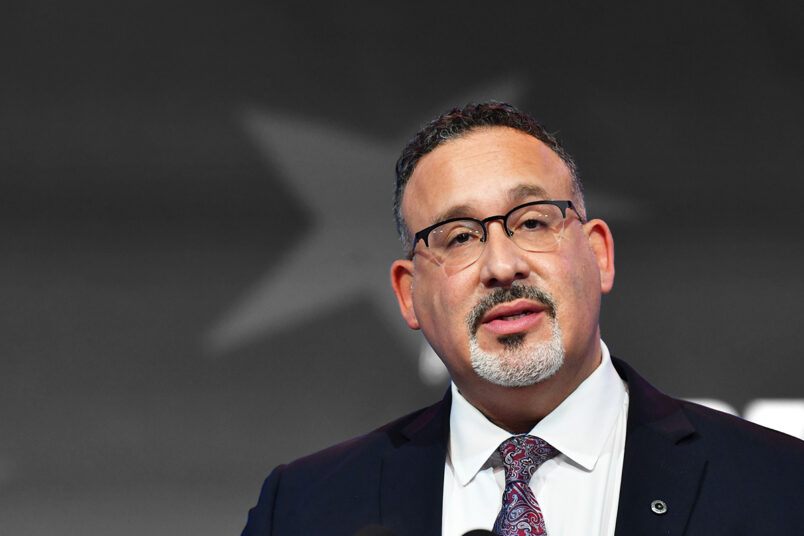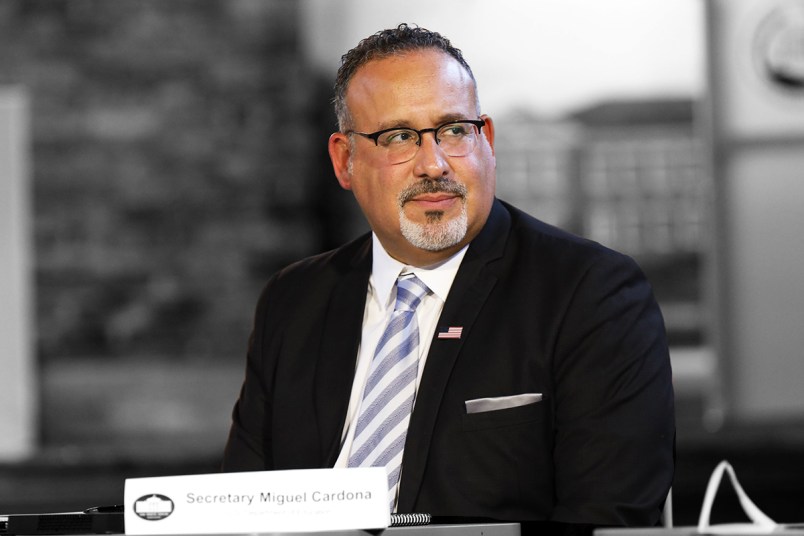Secretary of Education Miguel Cardona has walked into a series of fights that he doesn’t necessarily want to have. But now that they’ve come to him, he’s not shying away from the battles that have erupted in the nation’s school system.
Cardona was confirmed in March 2021. At the time, schools were still in the midst of the widespread shutdowns caused by the pandemic. In the months since schools have largely reopened, fights over masks and social distancing have given way to cultural controversies, stoked by right-wing activists who have focused on taking over school boards. New disputes flare up seemingly by the day, often around issues such as sexuality, the way in which Black history is taught, and treatment of transgender athletes.
In a conversation with TPM last Tuesday, Cardona said he believes the battles that have erupted since he took his post are linked, and that they “started with masks.”
“When we came in, more than half of the schools were not open full time. We knew the first job was to safely reopen our schools, get our students back in the classroom where they belonged,” Cardona said.
“We did that in the first eight or nine months, and then what we found was that, due to different opinions or folks not wanting to use mitigation strategies, it created some division,” he continued, adding, “Some folks looked at that as an opportunity to really politicize education as opposed to coming together, which is what our country needs.”
For his part, Cardona would prefer to focus on discussing his “proactive, positive agenda,” he said. He believes, for instance, that President Biden’s policies — including 2022’s Inflation Reduction Act and CHIPS and Science Act — will create “a tsunami of jobs.” Under Cardona, the Department of Education has prioritized initiatives that he says are designed to help students maximize these career opportunities. That’s the conversation Cardona would like to be having.
“I could waste my time going back and forth. We want to stay above that,” Cardona said of the various cycles of controversy.
“At the end of the day,” he added, “I don’t look at these students as Republican students or Democrats students. They’re students. And it’s my responsibility to serve them all. I don’t wanna get into the fray.”
‘I Consider It An Attack’
Yet, as much as Cardona would prefer to discuss efforts to increase school funding and address setbacks to students caused by the pandemic, he is not backing down from the other debates raging in the country right now including a wave of efforts to censor educational materials that mention LGBTQ issues and Black history or to allow students to opt out of those lessons.
Right-wing politicians and activists have framed efforts to block children from exposure to diversity as part of a backlash against “woke” ideology. They’ve also given considerable attention to disputes over whether to allow transgender athletes to participate in high school and college sports.
It’s all made schools — and conversations about what happens in the classroom — a political flashpoint.
Cardona sees this in rather stark terms.

“I don’t consider it a fight,” he said of the efforts to censor curricula and ban transgender athletes. “I consider it an attack on transgender students. I consider it an attack on students who are LGBTQ.”
“I also look at the curriculum attacks as a way to maintain division and an effort to make our public schools look weak,” he added.
Last month, Cardona wrote an op-ed in the Tampa Bay Times wherein he said it was “heartbreaking” to see efforts to change curricula and “book bans censoring stories of people of color or LGBTQ Americans.” Cardona tied these efforts to Republican calls to reduce funding for education. “In addition to spending their days fighting to ban books and Black history, some congressional Republicans are calling for steep cuts,” Cardona wrote, later adding, “In contrast with these political sideshows, the Biden administration has put forward real policies that give our schools and students the funding and support they need to succeed.”
Cardona’s choice of where to place his op-ed carried some weight. Florida has been ground zero in the recent disputes thanks to Gov. Ron DeSantis (R). In the past three years, as DeSantis is widely expected to be prepping a presidential run, he has focused again and again on Florida’s school system, banning books, curbing discussions of sexuality and gender, signing legislation to ban transgender athletes from playing women’s and girls’ sports, and fighting Black history courses.
While he expected the op-ed to have “national reach,” Cardona said his decision to address these issues in DeSantis’ backyard was deliberate.
“Florida is not the only place that is engaging in state level policies that are harming children or making students feel unwelcome,” Cardona explained to TPM. “However, I did visit Florida last year and I heard from parents and educators directly that they were scared, that they felt the students there were being used as pawns.”
“I chose to acknowledge those families and those students and, and educators from Florida by placing it in Tampa.”
DeSantis’ office did not respond to a request for comment on this story.
‘I Worry About The Civil Rights Of Students‘
The controversial nature of the issues consuming schools makes confronting them something of a tightrope walk. For example, on Thursday, two days after Cardona spoke to TPM, the Biden administration unveiled a plan to change Title IX regulations. The plan was designed to prevent schools from enacting blanket bans of transgender athletes. While it angered Republican leaders who support such bans, the proposal also drew fire from some transgender advocates since it would allow restrictions on transgender participants in some competitive high school and college athletics.
Cardona also tried to thread a needle as he suggested he supports “local control” of school systems while also highlighting the areas in which he, and his department, might want to get involved. As a former fourth grade teacher and a father himself, Cardona said he is adamant about the “connection” between parents and students. Ideally, he would like to see decisions made by local school boards and parents’ groups without “people who are hundreds of miles away from the classroom making decisions because it’s politically expedient for them.” However, Cardona doesn’t believe that hands off approach applies to policies that could make marginalized students “feel unwelcome in our schools.”
“The neighborhood,” he said, knows “what students should be having in that local community. They don’t need somebody from D.C. telling them what to do. Now, with that, I think attacks on students based on who they are is a major concern,” Cardona explained. “I worry about the civil rights of students. I worry about students not feeling welcome in the learning environment and what that could do to their emotional wellbeing and also their academic success.”
“I don’t look at these students as Republican students or Democrats students. They’re students. And it’s my responsibility to serve them all. I don’t wanna get into the fray.”
To that end, the Department of Education, in the Biden administration’s 2024 budget, has proposed increased funding for its office of civil rights, the entity that has spearheaded some investigations into conservative activists groups’ push to ban books.
Overall, Cardona attributes the wave of recent criticism directed at schools to a long-term conservative objective: diminishing public education in favor of private schools.
“Of course we have to take into account parent perspective,” Cardona said. “That’s always been the case, but I think some are trying to exploit differences of opinions in our country in order to make our schools look bad so they can push a private agenda.”
Cardona has framed his agenda in terms of trying to “raise the bar” for public schools. Under his leadership, the Department of Education has proposed increased funding to, among other things, close achievement gaps for disadvantaged students, expand mental health programs, provide more multilingual programming, and address shortages of special-needs teachers.
Cardona is blunt about his view that schools are not currently doing well enough. Among other things, he cited pandemic learning loss as well as suicide rates for girls and LGBTQ children.
“I’m not proud of the nation’s report card data that suggests our students have gone back because of the pandemic. But, as a lifelong educator, I wasn’t proud of the data before the pandemic,” Cardona said. “We have to raise the bar there, we have to close achievement gaps, we have to make sure that our students are getting instruction that’s relevant, that’s connected to the real world. … We’re not doing that well.”
While he isn’t backing away from tough conversations, Cardona doesn’t want to have them on others’ terms. Given Cardona’s opposition to right-wing education policy, TPM borrowed some of DeSantis’ terminology and asked the secretary if he considers himself “woke.” Cardona laughed at the suggestion.
“The language that is used to help divide education is not something that I subscribe to,” he said. “I’m student-centered.”







This is what patriotism looks like.
It shouldn’t have to be argued before a political bureaucrat, and never should any politician ever put personal party over national duty.
Oh yeah. The following is not a cat.

It’s an emoji. We just call it a cat.
Kudos to Cardona